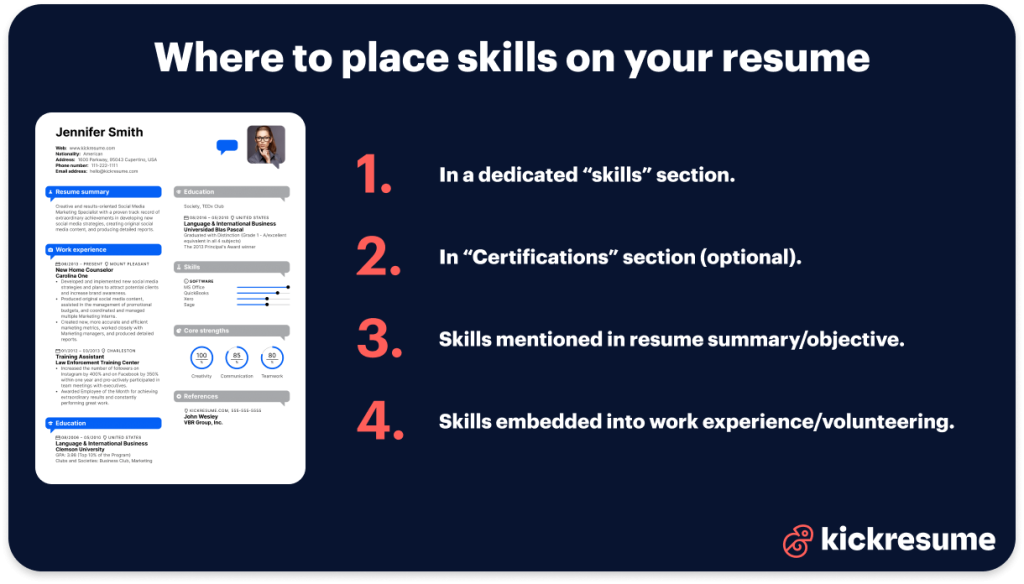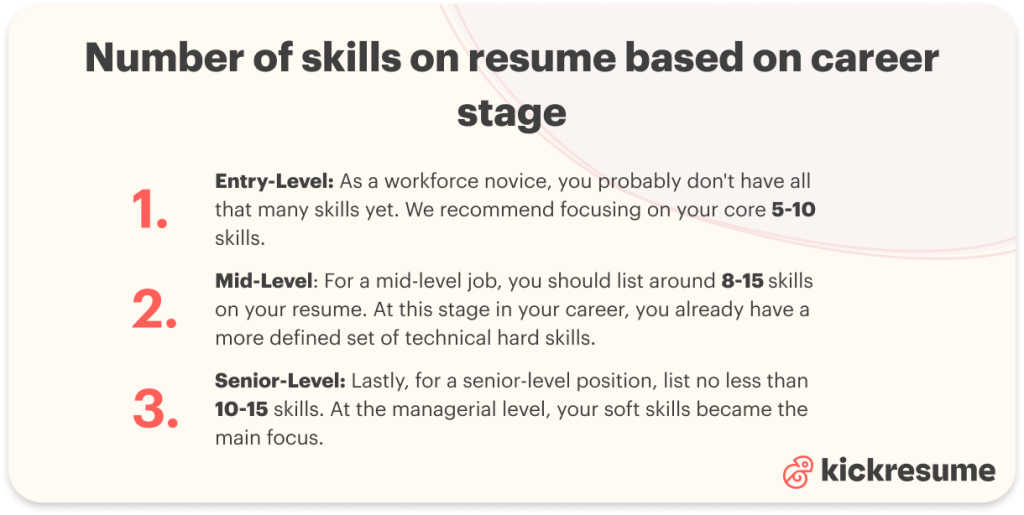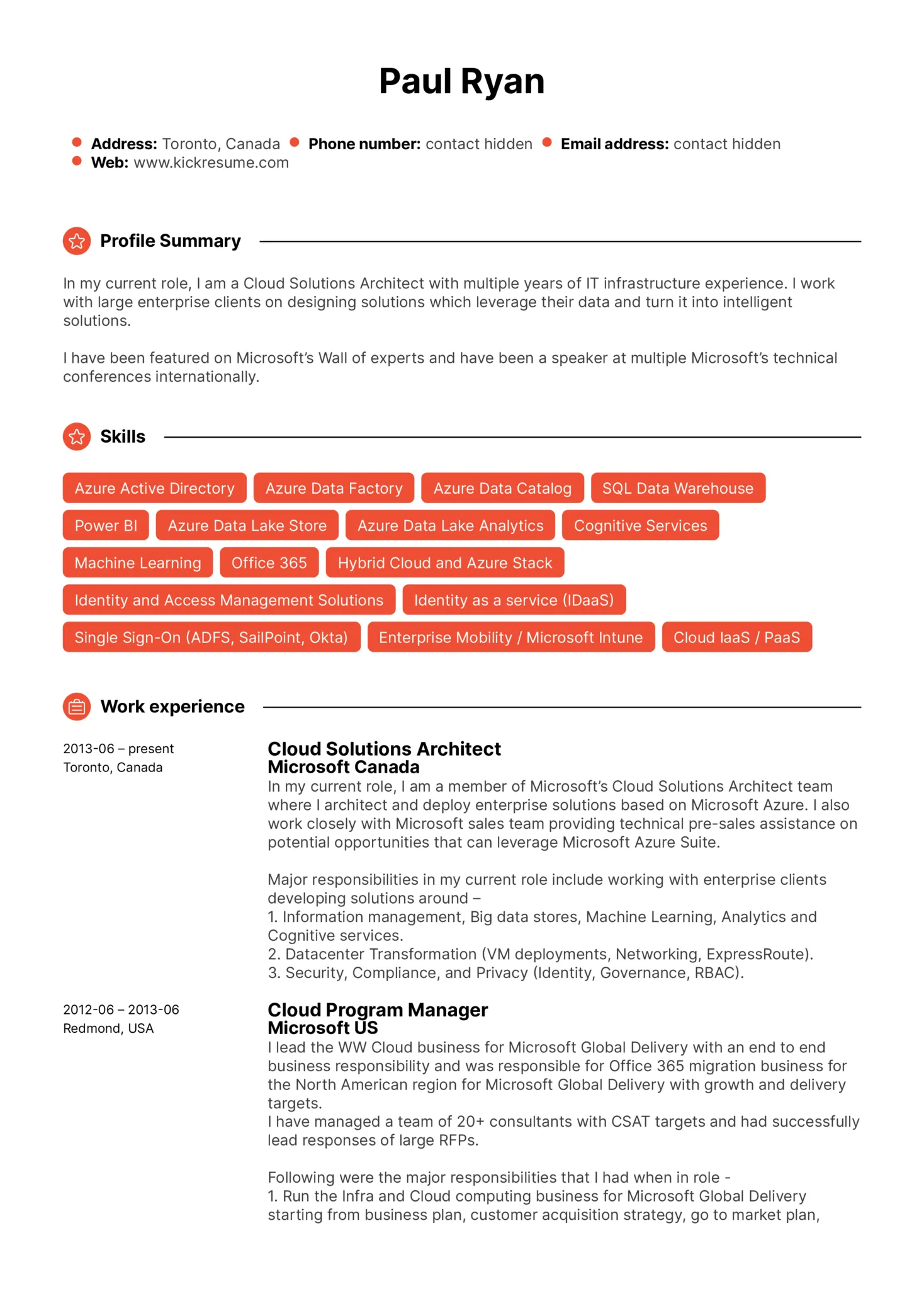Do you know how many skills to list on resume? Since you're currently reading this article, you must've been wondering about this too.
On one hand, you need to ensure you list enough relevant skills to show hiring managers you can handle the job's responsibilities.
On the other hand, you need to keep the number of listed skills reasonable while not selling yourself too short. Since your resume shouldn't exceed one page, brevity is key.
In a nutshell, you can include anywhere between 5-15 skills on your resume overall, depending on where you currently are in your career (and your industry). But, there's a "but".
In this article you'll find:
- Why it's important to include skills on resume;
- Where to put skills on your resume;
- How many skills to list on resume;
- How to know which skills to list;
- Best skills to include for 7 different job positions.
- What are skills on resume?
- Why is it important to include skills on your resume?
- Where to place skills on your resume?
- How many skills to list on resume?
- Resume hack: Skills-based resume
- How to know which skills to list on resume in 5 steps
- Best skills to put on a resume for different job positions
- Key takeaways: How many skills to list on a resume?
What are skills on resume?
Put simply, skills stand for specific abilities and expertise you, as a potential employee, bring to the table.
Nevertheless, skills are not homogeneous and can be further divided into two basic categories:
- Soft skills
- Hard skills
Both types of skills are necessary to be considered a well-rounded, and therefore desirable, employee.
1. Soft skills
Soft skills, also known as transferable skills, are the non-technical skills that relate to how you work and interact with your colleagues, clients, or customers.
For these reasons, soft skills are often referred to as interpersonal skills – and are closely tied to your personal traits (your behaviour, emotional intelligence, your attitude).
Soft skills are increasingly sought after by employers in every industry. A Harvard study shows that more than 80% of success in one's career is determined by their soft skills.
These are some of the most desired soft skills in an employee according to research:
- Communication
- Willingness to learn
- Teamwork
- Leadership
- Problem-solving
- Friendliness
2. Hard skills
By comparison, hard skills are very specific, teachable and easy to measure.
Hard skills are related to technical competencies required in a specific job or industry.
Recruiters often list them directly in job postings to make it clear what technical knowledge of proficiencies you need to be considered for that particular job position.
You can acquire them through education, training programmes, certifications, or other forms of training.
Hard skills can be further divided into several subcategories, such as:
- Language proficiencies (CPE, DELF, IELTS, DSH,…)
- Computer skills (Microsoft Excel, Adobe Photoshop, HTML, Python, …)
- Finance and accounting skills (QuickBooks, SAP, tax preparation, bookkeeping, …)
- Marketing and social media skills (SEO, PPC, CMS, …)
- Trade skills (welding, plumbing, carpentry, …)
If you want to expand your skill set or change careers, these 9 high-income skills can help you find your new calling.
Why is it important to include skills on your resume?
Apart from your previous work experience, the skills section is what most attracts recruiters' attention. This is because your skills serve as the representation of what you can actually do.
In recent years, there's been an interesting development in hiring trends. More and more companies seem to favour skills-first recruiting process over the traditional credentials-based one.
This means that recruiters no longer consider university degrees or years spend in the workforce as the most telling indicators of a candidate's potential.
Instead, their focus gradually shifts towards, you guessed it, the applicant's skills.
Moreover, showcasing your skills on resume can directly influence how far down the hiring process you'll get. After all, who wants to hire a person who has nothing to contribute to their company?
Fail to list your skills, and your chances at landing a job interview will shrink to smithereens.
Where to place skills on your resume?
When it comes to marking down your skills, there are 4 ways of how to approach this issue.
It's important to note that these are NOT mutually exclusive. On the contrary, the best resumes use a combination of all of the following:
- Dedicated skills section. This is, by far, the most obvious strategy. Create a separate section on your resume under the heading “skills” and simply list all your relevant skills there. For better readability, you can also group your skills under more specific subheadings (language skills, computer skills, coding skills, …).
- Certifications. When you're trying to fit your resume to one page, every inch of space is precious. If you decide to include a “Certificates” section on your resume, consider if it's necessary to repeat certain skills in the “Skills” section to avoid redundancy. For instance, if you include your CPE under “Certificates”, you don't have to mention English proficiency again in your “Skills”.
- Skills mentioned in resume summary/objective. If the job posting you're responding to puts extra emphasis on certain skills, consider including those in your resume summary – since the summary sits at the very top of your resume.
- Skills embedded into work experience. Finally, you can weave your skills into bullet points describing your work experience entries. This is especially fitting if you want to display your soft skills more organically. For example, instead of putting “leadership” under the “Skills” heading, you can mention that you've “Led the successful launch of a new product line while coordinating cross-departmental teams.”

How many skills to list on resume?
How many skills you list on a resume varies depending on several factors, such as how far along you are into your career journey and the industry you work in.
That's why, unfortunately, we can't give you any magical one-size-fits-all answer.
For example, a full-stack web developer is expected to have a greater number of hard skills compared to a PR representative. But, a PR representative must possess a greater number of soft skills than a full-stack web developer.
Furthermore, the number of skills on your resume will naturally evolve together with your career path:
- Entry-level position. As a workforce novice, you probably don't have all that many skills yet. We recommend focusing on your core 5-10 skills. If you think this number is too low, don't panic. For entry-level positions, employers look for candidates with only fundamental skills in any given field. The skills you've picked up during your studies, internships, or personal projects will do just fine.
- Mid-level position. For a mid-level job, you should list around 8-15 skills on your resume. At this stage in your career, you already have a more defined set of technical hard skills. Plus, you've already developed a solid number of soft skills too.
- Senior level position. Lastly, for a senior-level position, list no less than 10-15 skills. At the managerial level, your soft skills became the main focus. When curating skills for a senior-level resume, prioritize those that highlight your expertise in leadership, strategic planning, management, complex problem-solving, and industry-specific knowledge.

Resume hack: Skills-based resume
If you want to position your skills front and centre, consider switching your traditional chronological resume for a skills-based resume.
Unlike chronological resume, skills-based resume places your “skills” section at the very top of the page, forcing the “education” and “work experience” sections to take the back seat.
This resume format is best suited for those who lack a continuous, long-term work experience in a specialized position. In other words, for fresh graduates, career changers, or those who lack relevant work experience.
However, if the company you're applying for uses Applicants Tracking System, refrain from using a skills-based format. Some ATSs can't read resume formats other than the traditional one. Consequently, your resume could be discarded without ever reaching the recruiters' eyes.
Below, you can see what a skills-based resume (also known as functional resume) can look like:
How to know which skills to list on resume in 5 steps
Every single resume you send must be tailored to specific job description. This rule applies to your skills too.
Here is a simple 5-step guide to help you decide which skills to highlight on your resume:
- (Re)read the job posting.
Go back to the job description and read it thoroughly. Focus on sections describing the role, requirements, and responsibilities.
- Highlight any skills that pop up.
If some of them come up 2 or more times throughout the job posting, take a special note of them. These are the key skills the recruiters are looking for and you should absolutely have them on your resume.
- Match the required skills to yours.
Which of the required skills do you actually have? Certainly, you could lie, but believe us, it's not worth it. Sooner or later, the truth will come out. Recruiters have a way of probing all information on your resume.
- Incorporate your skills throughout the resume.
Now it's time to decide where to place your skills. Which of them can you incorporate into other resume sections? Do any of them fit in your work experience description? Will you create a separate skill section? And, don't forget to also mention key skills (those reoccurring in your job posting) straight in the resume summary.
- Make sure to use precise wording.
This has to do mainly with the use of ATS. These software programmes are designed to scan an applicant's resume and extract information from it in the form of specific keywords. In order to make an ATS-friendly resume, you must word and spell your skills precisely as they appear in the job posting. If not, the ATS may not recognize the presence of the skills on your resume and, as a consequence, will mark them as absent. This may cost you precious points.
Best skills to put on a resume for different job positions
The number and nature of skills that should feature on your resume changes from profession to profession.
If you're in a situation where you need a bit of inspiration, this subchapter may be helpful to you.
Below, you'll find 7 resume samples which were created by real people (with the exception of the first resume) who managed to get hired by companies worldwide.
1. Project management skills
For project managers, having excellent hard skills specific for the industry of your choice simply isn't enough.
Still, there are some hard skills that are universally useful for project managers across all industries. Project management techniques and methodologies are a good example – methodologies such as:
- Waterfall
- Agile
- Scrum
- Kanban
- Lean
- Critical Chain Management (CCM)
Additionally, all managerial positions require these soft skills:
- Leadership
- Communication
- Problem-solving
- Negotiation
- Time management
2. Web development skills
Web developers need a mix of technical skills and interpersonal skills to design, create, and maintain websites and web applications.
These skills can vary depending on the focus area of web development (front-end, back-end, or full-stack).
Some of the essential hard skills for web developers include:
- Hypertext Markup Language (HTML)
- Cascading Style Sheets (CSS)
- JavaScript
- Bootstrap
- React
- Ruby
- Python
- PostgreSQL
3. Cloud computing skills
Cloud computing skills are increasingly sought after as businesses move their operations to cloud platforms for greater scalability, efficiency, and cost savings.
These skills encompass a broad range of abilities, from understanding cloud service models to managing cloud infrastructure and services.
Here's an overview of basic cloud computing skills:
- Infrastructure as a Service (IaaS)
- Microsoft Azure
- Google Cloud Platform (GCP)
- Virtual Private Cloud (VPC)
- Kubernetes
- Azure Functions
- Content Delivery Network (CDN)
4. Data analysis skills
Data analysts play a pivotal role in processing and interpreting data.
Thanks to them, businesses can make informed decisions, requiring a blend of technical and analytical skills.
Here's a breakdown of the best skills for data analysts:
- Tableau
- Power BI
- Visual Studio
- SQL
- Python
- Machine learning algorithms
- Keras
- R
5. Software engineering skills
Software engineers are responsible for designing, developing, testing, and maintaining software systems.
These are the most common required skills for software engineers:
- Java
- C++
- Python
- JavaScript
- Junit
- Selenium
- MySQL
- MongoDB
- Cassandra
- Software Development Life Cycle (SDLC)
- Knowledge of data structures (e.g., arrays, linked lists, trees, graphs)
6. Video editing skills
Video editing combines technical proficiency with artistic vision.
If you want to start your career as a video editor, we strongly advise you to tap into these video editing skills:
- Adobe Premiere Pro
- Final Cut Pro X
- DaVinci Resolve
- Avid Media Composer
- Adobe After Effects
7. Graphic design skills
Graphic design is a field that marries creativity with technology, requiring an interplay of artistic ability and technical expertise.
Successful graphic designers can convey messages visually in a way that resonates with their target audience.
These skills cannot be absent from any graphic designer's arsenal:
- Creative Suite (Photoshop, Illustrator, InDesign, Figma)
- Understanding of layout and composition
- Color theory
- Photography
- Image editing
- Digital illustration
Key takeaways: How many skills to list on a resume?
Depending on your career stage, you should include between 5-15 skills on your resume, balancing both hard and soft skills to present yourself as a well-rounded candidate.
Based on your career stage, the number of skills on your resume should be as follows:
- Entry-level position. We recommend focusing on your core 5-10 skills.
- Mid-level position. For a mid-level job, you should list around 8-15 skills on your resume.
- Senior level position. Lastly, for a senior-level position, list no less than 10-15 skills.
However, these numbers can change in relation to specific job position and industry requirements.
When it comes to the question of where to place skills on your resume, you have several options that you can combine:
- Dedicated skills section.
- Skills embedded into work experience.
- Skills mentioned in resume summary/objective.
- Certifications.











